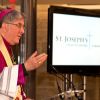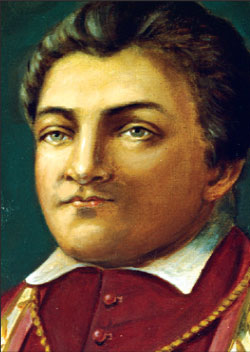 Bishop Michael Power
Bishop Michael Power
A native of Halifax, Michael Power was founding bishop of the Diocese of Toronto and the first English-speaking bishop born in Canada.
He arrived in Toronto in 1842 and quickly went to work building Canada’s newest diocese, which at the time encompassed the Niagara Peninsula, all of southwest Ontario to Windsor and north to Lakes Huron and Superior.
Among his achievements was founding St. Michael’s Cathedral. Construction began in April 1845; however, Bishop Power did not live to see it completed. While ministering to immigrants dying of typhus, he contracted the disease and died in 1847 shortly before his 43rd birthday. He was buried beneath his unfinished cathedral.
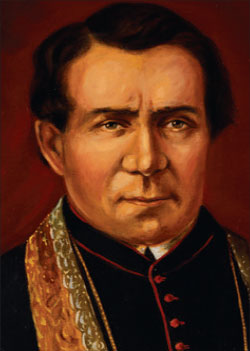 Bishop Armand François Marie de Charbonnel P.S.S.
Bishop Armand François Marie de Charbonnel P.S.S.
Toronto was without a bishop for 30 months until Armand François Marie de Charbonnel was consecrated in the Sistine Chapel by Pope Pius IX on May 26, 1850 and sent to succeed Michael Power.
Over the next decade, he doubled the number of priests and parishes. He built 23 new churches as the Catholic population grew to 43,000. He used personal funds to finish the Cathedral and brought the Basilian Fathers, the Christian Brothers and the Sisters of St. Joseph to Toronto to staff schools and provide services for the poor.
He retired in 1860 and adopted a monastic life in his native France. He died in 1891 at age 88.
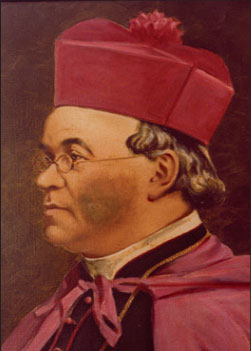 Archbishop John Joseph Lynch C.M.
Archbishop John Joseph Lynch C.M.
Irish-born, John Lynch became Toronto’s coadjutor bishop in 1859 and succeeded Bishop de Charbonnel one year later. He became Toronto’s first archbishop in 1870 when Toronto was raised to an archbishopric by Pope Pius IX.
Under Archbishop Lynch, 70 priests were ordained as he built 40 churches and seven convents, while supporting the Sisters of St. Joseph who expanded services for the poor and opened Sunnyside Orphanage. He also welcomed the Redemptorist Fathers, Carmelite Sisters, Sisters of the Precious Blood and Sisters of the Good Shepherd to Toronto.
He fell ill in 1882 and was assisted by Auxiliary Bishop Timothy O’Mahoney until his death in 1888 at age 72.
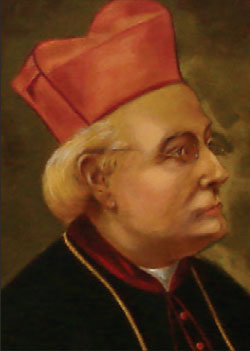 Archbishop John Walsh
Archbishop John Walsh
John Walsh was made archbishop in a ceremony marred by some Orangeman pelting his carriage with stones as he arrived at St. Michael’s Cathedral. Irish born, he came to Toronto from Sandwich (now Windsor, Ont.), where he had served as bishop since 1867.
He continued the work of his predecessors in solidifying Catholic health, education and social services. He also undertook a Cathedral restoration by adding St. John’s Chapel and redecorating the Cathedral’s interior. As St. Michael’s Cemetery neared capacity, he opened Mount Hope Cemetery in 1898. He also founded the St. Vincent de Paul Society.
Archbishop Walsh died in 1898 at age 68 and was buried in St. Michael’s Cathedral.
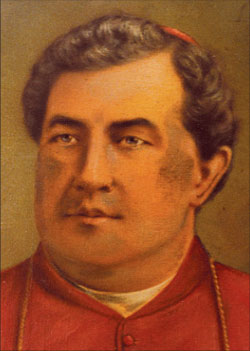 Archbishop Denis O'Connor C.S.B.
Archbishop Denis O'Connor C.S.B.
Denis O’Connor was born in Pickering, schooled at St. Michael’s College, ordained by Bishop John Lynch in 1863 and became Bishop of London in 1890.
Made Archbishop of Toronto in 1899, he was a disciplinarian who enforced a doctrinal rigour that upset some priests and laity. He stressed religious instruction in schools. A proponent of fiscal restraint, he opened just four new parishes despite a sharp rise in the Catholic population. He did, however, commission a shrine to honour the Jesuit martyrs in Huronia, which eventually became the Martyrs’ Shrine.
Ill health and the burdens of office caused him to resign in 1908. He died in 1911.
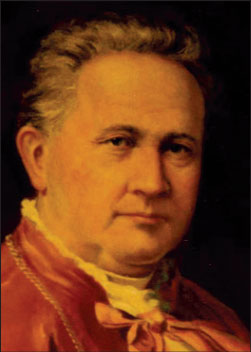 Archbishop Fergus McEvay
Archbishop Fergus McEvay
Fergus McEvay accomplished much in just three years as Toronto archbishop. Born in Lindsay and educated at St. Michael’s College, he was made Bishop of London in 1899 and replaced Denis O’Connor as Toronto archbishop in 1908.
He quickly established seven new parishes and approved construction of 10 churches. He also founded the Canadian Catholic Extension Society (which became Catholic Missions In Canada) and assured generations of Canadian ordinations by launching construction of St. Augustine’s Seminary.
Suffering from a blood disease since his arrival in Toronto, Archbishop McEvay, age 58, died on May 10, 1911 — before the seminary opened — and was interred at St. Augustine’s.
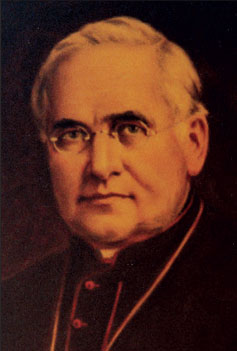 Archbishop Neil McNeil
Archbishop Neil McNeil
A Nova Scotia native, Neil McNeil served two years as Archbishop of Vancouver before 22 years as Archbishop of Toronto, starting in 1912. They were years in which Toronto’s Catholic population doubled.
In addition to completing St. Augustine’s Seminary, Archbishop McNeil created 32 new parishes, including parishes for non-English speaking immigrants.
He also campaigned for fair distribution of taxes to Catholic schools, and encouraged good relations between Catholics and Protestants, leading to the creation of the Federation of Catholic Charities. He oversaw the launch of the China Mission Seminary (later the Scarborough Foreign Missionary Society) and the Newman Club. He died on May 25, 1934, buried at St. Augustine’s Seminary.
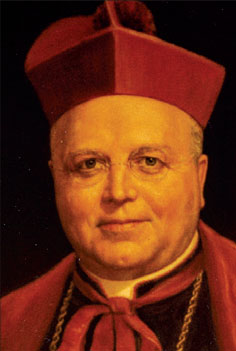 Archbishop James Cardinal McGuigan
Archbishop James Cardinal McGuigan
James McGuigan was made Archbishop of Regina at age 35 and remained five years before being named Archbishop of Toronto in 1934. The PEI native led the archdiocese for an unprecedented 36 years. In 1946, he became Canada’s first-English speaking cardinal, and participated in the 1958 conclave that elected Pope John XXIII.
He initiated successful fundraising campaigns to pay the debt on St. Augustine’s Seminary, raise money for Catholic Charities, open high schools and add new parishes with ethnic priests to serve the immigrants who poured into Toronto following World War II.
Assisted for health reason after 1961 by coadjutor Archbishop Philip Pocock, he resigned in 1971 and died in 1974.
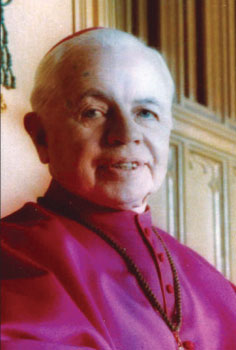 Archbishop Philip Porock
Archbishop Philip Porock
Philip Pocock became a bishop at age 37 and went from Bishop of Saskatoon to Archbishop of Winnipeg to coadjutor and then Archbishop of Toronto in 1971.
Born in St. Thomas, Ont., he arrived as Vatican II was being implemented and managed the transition by creating a senate of priests, a pastoral council and by urging laity to become more active in parish life.
During his seven years, several new parishes were opened. But he is best remembered for launching ShareLife after removing Catholic Charities from the United Way.
Health issues caused him to resign as archbishop in 1978 but he remained an active priest until his death at age 78 in 1984.
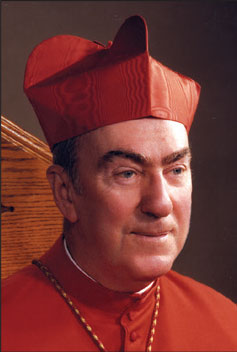 Archbishop Gerald Emmett Cardinal Carter
Archbishop Gerald Emmett Cardinal Carter
A Montreal native, Gerald Emmett Carter made his mark in Catholic education in his home city before being named Auxiliary Bishop of the Diocese of London and then Bishop in 1964. He was appointed Archbishop of Toronto in 1978. One year later, he was elevated to the College of Cardinals.
The cardinal was active in improving race relations, fighting against abortion, protecting the rights of Catholics and securing affordable housing for low-income families, senior citizens and the disabled. He was also active in opening Covenant House for street youth and in gaining full government funding for Catholic high schools.
He resigned as archbishop in 1990 and died in 2003 at age 91.
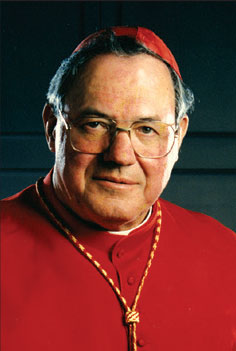 Archbishop Aloysius Cardinal Ambrozic
Archbishop Aloysius Cardinal Ambrozic
A native of Slovenia, Aloysius Ambrozic was appointed Auxiliary Bishop of Toronto in 1976. He became coadjutor Archbishop to Cardinal Carter in 1986, became Archbishop in 1990 and was elevated to the College of Cardinals in 1998.
As archbishop for 16 years, he saw Canada’s largest diocese become a multicultural, multi-racial community that grew from 1.1 to 1.6 million Catholics. He built 25 new churches, most in the rapidly expanding suburbs around the city, as ethnic parishes and groups flourished. He also created an office of youth ministry to develop spiritual and social programs for young people.
He retired as archbishop in 2006 and died in 2011 at age 81.
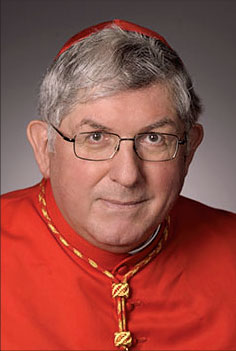 Archbishop Thomas Cardinal Collins
Archbishop Thomas Cardinal Collins
After nine years in Alberta as Bishop of St. Paul and then Archbishop of Edmonton, Guelph native Thomas Collins returned to Ontario to be installed in 2007 as Archbishop of Toronto. He was made a cardinal in 2012.
He has led efforts to welcome refugees and highlight the persecution of Christians worldwide. He has also denounced assisted suicide and euthanasia while arguing for conscience-protection rights for health care professionals.
In 2012, he issued a Pastoral Plan for the archdiocese. He also led a successful Family of Faith capital campaign, which has exceeded $170 million in donations and pledges to support the goals of the pastoral plan. In 2016 he rededicated St. Michael’s Cathedral Basilica after an extensive restoration.
EDMONTON - Catholics from Edmonton are elated to learn their former archbishop has been elevated to the College of Cardinals.
The announcement that Archbishop Thomas Collins, now archbishop of Toronto, will be a cardinal was made at the Vatican Jan. 6.
After serving as archbishop in St. Paul, Alta., Collins was the archbishop in Edmonton from June 1999 to January 2007.
Counting our Canadian cardinals - Collins is #16
Archbishop Collins - A wise choice
The title of “Cardinal” derives from the Latin word cardo, meaning hinge. When cardinals became integral to the Church many centuries ago, they were likened to hinges that let the gates of the Vatican swing open to the outside world. Cardinals were the hardware that, in a tangible way, connected the people to the Pope and the Pope to the people.
That function — advising the Pope and being his eyes and ears among Catholics worldwide — remains vital today and is why Archbishop Thomas Collins was such an astute selection for the College of Cardinals. As an archbishop in Toronto the past five years and in Edmonton seven years before that, Collins has been a sturdy hinge for the Canadian Church.
Toronto Archbishop Thomas Collins elevated to Cardinal
TORONTO - Receiving the honour of a papal invitation to join the College of Cardinals means Toronto Archbishop Thomas Collins will become an advisor to Pope Benedict XVI, likely be assigned a symbolic parish in Rome and acquire important commissions from the pontiff.
And as the highest-ranked Catholic prelate outside Quebec, he will also be delegated the responsibility of becoming the primary spokesman for the Church in English Canada. As an archbishop, he is familiar with the role. As a cardinal, it takes on greater weight.
That’s not to suggest the new cardinal will become wildly outspoken. That’s not his style, nor should it be. But Collins, who was designated on Jan. 6 by the Pope to become a cardinal, expects to be proactive to ensure that Church positions on important social justice and life issues are voiced in the public forum.
VATICAN CITY - Along with statistics on the 22 new cardinals named by Pope Benedict XVI, the Vatican press office offered journalists quick biographical notes -- mainly drawn from Wikipedia.
"If we'd had a week, we would have prepared official biographies," Jesuit Father Federico Lombardi, Vatican spokesman, told Catholic News Service Jan. 9.
The vast majority of profiles handed out Jan. 6 were brief and factual.
Cardinal-designate Thomas Collins' press conference following mass at St. Michael's Cathedral on January 6, 2012.
For more visit www.archtoronto.org/cardinal and explore our own archives here on The Catholic Register.
- video courtesy of the archdiocese of Toronto
OTTAWA - Congratulations and praise for Cardinal-designate Thomas Collins’ elevation to the College of Cardinals Jan. 6 poured in from politicians, brother bishops and organizations across Canada.
“The appointment of Thomas Collins to the College of Cardinals is a great honour for His Grace as well as the archdiocese of Toronto and all members of the Catholic Church across Canada — a testament to his hard work and faithful devotion to the Church and spiritual life,” said Prime Minister Stephen Harper Jan. 6 in a message of congratulations.
Harper remarked on the leadership role the College of Cardinals plays in the Catholic Church and described Collins’ career as “long and distinguished.”
February consistory to create new cardinals will feature changes
VATICAN CITY - In part to avoid giving the impression that becoming a cardinal is a sacrament or quasi-sacrament, Pope Benedict XVI will use a revised, streamlined prayer service to create 22 new cardinals in February.
"The rite used up to now has been revised and simplified with the approval of the Holy Father Benedict XVI," the Vatican newspaper, L'Osservatore Romano, reported Jan. 7.
The paper said there would not be a "ring Mass" the day after the consistory; the new cardinals will receive their red hats, their cardinal rings and the assignment of their titular churches in Rome during the same ceremony Feb. 18.
22 new cardinals named by Pope Benedict
VATICAN CITY - Pope Benedict XVI named 22 new cardinals, including one from Canada and two from the United States, and announced a consistory for their formal induction on Feb. 18.
Among those named were Archbishop Thomas C. Collins of Toronto; Archbishop Timothy M. Dolan of New York; and Archbishop Edwin F. O'Brien, a former archbishop of Baltimore who now serves as grand master of the Equestrian Order of the Holy Sepulcher of Jerusalem.
The pope's nominations included 10 Roman Curia officials and 16 Europeans, confirming a trend in his cardinal appointments since his election in 2005.
Pope's 2012 to include synod, international trips, canonizations
VATICAN CITY - A trip to Latin America, a Synod of Bishops on new evangelization, the start of the Year of Faith, creation of new cardinals and proclamations of new saints are all on Pope Benedict XVI's calendar for 2012.
Of particular interest to the United States, the pope will also continue his meetings with groups of U.S. bishops making their "ad limina" visits to the Vatican during the first half of the year. His talks to the bishops are expected to focus on themes of education, religious freedom and the relationship between culture and religion.
The 2012 highlights are only a small part of the pope's day-to-day schedule, which includes hundreds of meetings, speeches, messages and liturgies. The German pope, who turns 85 in April, also pursues a "private" agenda of writing whenever he gets the chance, as he works to complete the latest in his "Jesus of Nazareth" series of books -- this one on Jesus' infancy and childhood.
Donations can be made with click of mouse in Toronto archdiocese
TORONTO - The archdiocese of Toronto has launched an online donation portal that will now give parishioners the opportunity to donate to their parish and Catholic charities with the click of a button.
"It's pretty exciting because a parishioner can go online and make a donation to either their offertory, building fund or capital campaign," said Quentin Schesnuik, manager of planned giving and personal gifts with the archdiocese.
St. Joe's brings back Our Lady of Mercy Hospital, sort of
TORONTO - Our Lady of Mercy is back in Toronto, gleaming and armed with the latest technology while making room for families, children and newborn babies.
St. Joseph's Health Centre blessed its new, four-story patient care wing Dec. 5. The new wing carries on the name of the old Our Lady of Mercy Hospital. The original Our Lady of Mercy merged with St. Joseph's in 1980 and finally closed in 1998.
The new $73-million, 130,000-square-foot wing adds a neonatal intensive care unit, a family birthing centre, a pediatric unit with six surgical day care beds and six medical day care beds, 92 more adult inpatient beds and a child and adolescent mental health unit which includes a full-time classroom.
Toronto parishioners seem to accept new Missal
TORONTO - Toronto’s first run at the new Sacramentary hit a few rough spots but didn’t upset many parishioners.
“I didn’t notice a lot of difference. It was more what the priest says, I think,” noted Our Lady of Lourdes parishioner Peter Maigher at the end of the 11:30 a.m. Sunday Mass. Maigher’s reaction was typical of what churchgoers told The Catholic Register at Nov. 26-27 Masses.
Archbishop Collins looks forward to three 'great' Church events
The following is an address delivered by Toronto Archbishop Thomas Collins at the 32nd Annual Archbishop’s Dinner, Oct. 27, at the Metro Toronto Convention Centre, Toronto.
This evening, as we come together for this great annual dinner in support of so many worthy causes, our joy is tempered by our sadness at the recent death of His Eminence, Aloysius Cardinal Ambrozic, who so faithfully served our family of faith as its spiritual leader from 1990 until 2007, and who now has completed his earthly journey. We continue to benefit from the blessings that flowed from his wise leadership, and I in particular will always be grateful for his warm welcome when I came from Edmonton to succeed him here as Archbishop. May his soul, and the souls of all of the faithful departed, through the mercy of God, rest in peace.


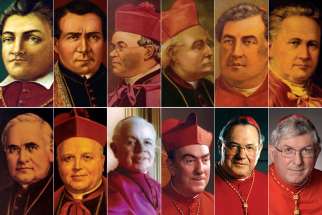





![[video interview] Cardinal-designate Thomas Collins discusses his new role](/media/k2/items/cache/051bcb32c2160d2b7f74c87e9d0d40b1_Generic.jpg)





